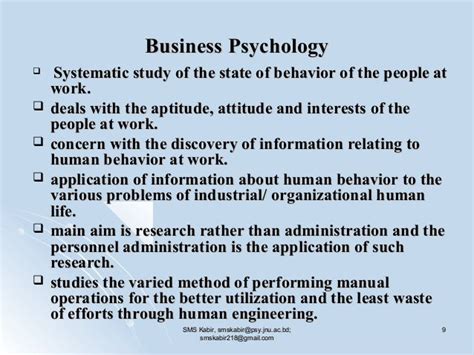Psychology and accounting are two seemingly disparate fields, but they are actually closely intertwined. Psychology can provide valuable insights into how people think, feel, and behave, which can be extremely helpful for accountants who need to understand the motivations and decision-making processes of their clients.

For example, psychology can help accountants to:
- Understand the financial decision-making process. People make financial decisions based on a variety of factors, including their cognitive biases, emotions, and social influences. By understanding these factors, accountants can better predict how clients will react to different financial situations and make more informed decisions on their behalf.
- Improve client relationships. Accountants who have a good understanding of psychology can build stronger relationships with their clients by understanding their needs and motivations. This can lead to increased trust and cooperation, which can make the accounting process smoother and more efficient.
- Identify and prevent fraud. Fraud is a major problem for businesses, and it can be difficult to detect. However, psychology can provide some valuable insights into the minds of fraudsters. By understanding the psychological factors that contribute to fraud, accountants can be more vigilant in their efforts to detect and prevent it.
In addition to the specific benefits listed above, psychology can also provide accountants with a more general understanding of human behavior. This can be helpful in all aspects of accounting, from understanding how clients make financial decisions to developing marketing strategies to attract new business.
Specific Examples of How Psychology Can Be Used in Accounting
Here are a few specific examples of how psychology can be used in accounting:
- Cognitive biases. Cognitive biases are mental shortcuts that people use to make decisions. These biases can lead to errors in judgment, which can have a negative impact on financial decisions. Accountants can help clients to avoid cognitive biases by being aware of them and taking steps to mitigate their effects.
- Emotions. Emotions can play a significant role in financial decision-making. For example, people who are feeling anxious or stressed may be more likely to make impulsive decisions. Accountants can help clients to manage their emotions and make more rational financial decisions.
- Social influences. Social influences can also have a significant impact on financial decision-making. For example, people who are surrounded by friends and family who are making poor financial decisions may be more likely to make poor financial decisions themselves. Accountants can help clients to resist social influences and make more informed financial decisions.
Conclusion
Psychology is a valuable tool that can be used by accountants to improve their understanding of clients, make better decisions, and prevent fraud. By incorporating psychological principles into their work, accountants can provide their clients with a higher level of service and help them to achieve their financial goals.
Table 1: How Psychology Can Be Used in Accounting
| Area of Accounting | How Psychology Can Be Used |
|---|---|
| Financial decision-making | Understand the cognitive biases, emotions, and social influences that affect financial decision-making. |
| Client relationships | Build stronger relationships with clients by understanding their needs and motivations. |
| Fraud prevention | Identify and prevent fraud by understanding the psychological factors that contribute to fraud. |
| Marketing | Develop marketing strategies that are more effective at attracting and retaining clients. |
Table 2: Cognitive Biases That Can Affect Financial Decision-Making
| Cognitive Bias | Description | Example |
|---|---|---|
| Confirmation bias | The tendency to seek out information that confirms our existing beliefs. | Ignoring evidence that contradicts our beliefs about a stock. |
| Anchoring bias | The tendency to rely too heavily on the first piece of information we receive. | Basing a financial decision on the first piece of advice we receive from a financial advisor. |
| Availability bias | The tendency to overestimate the likelihood of events that are easily recalled. | Overestimating the risk of a particular investment because we have recently heard about a similar investment that failed. |
Table 3: Strategies for Mitigating Cognitive Biases
| Strategy | Description |
|---|---|
| Be aware of your own cognitive biases. | The first step to mitigating cognitive biases is to be aware of them. |
| Seek out diverse information. | Don’t rely on a single source of information. Get multiple perspectives before making a financial decision. |
| Consider the long-term consequences of your decisions. | Don’t make financial decisions based on short-term emotions. Consider the long-term consequences of your actions. |
| Talk to a trusted advisor. | If you’re not sure how to make a financial decision, talk to a trusted advisor, such as a financial planner or accountant. |
Table 4: How to Build Stronger Client Relationships
| Strategy | Description |
|---|---|
| Get to know your clients. | Take the time to get to know your clients on a personal level. Understand their needs, goals, and motivations. |
| Be responsive to your clients’ needs. | Respond to your clients’ inquiries promptly and professionally. Make sure they know that you’re there for them. |
| Keep your clients informed. | Keep your clients informed about their financial situation and any changes that may affect them. |
| Go the extra mile. | Do something extra for your clients, such as providing them with financial advice or helping them to file their taxes. |
